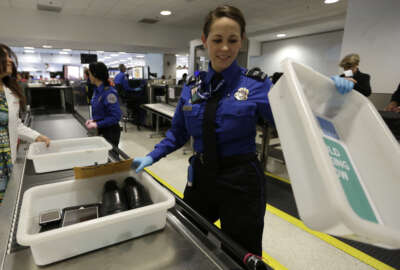A storm may be brewing between the Transportation Security Administration and the union that represents most of its employees, the American Federation of Government Employees.
TSA released a determination on collective bargaining on Aug. 25, which changed some of the rules between the agency and the union. AFGE and TSA are currently involved in extended contract negotiations after TSA employees voted down the agreement reached in late 2015.
AFGE responded to the determination shortly after, including a statement from AFGE National President J. David Cox, Sr.
“This new determination proves once again that TSA is not interested in following the universally accepted norms of labor law,” Cox said. “TSA wants to create a one-way relationship where the agency holds all of the cards, leaving TSA officers out to dry.”
TSA told Federal News Radio in an email that the determination does little to change the rules that have been in place since 2014.
“The determination establishes the framework for collective bargaining and labor relations. … It also establishes the specific issues that can be negotiated,” the statement said. “Overall the determination remains the same as the previous versions — with a few additions. These include returning parking subsidies as a negotiable topic, revising the negotiation time frame from 45-calendar days to 45-business days, including references to collaboration and cooperative problem solving between TSA and AFGE, and the positive role of the union in the workplace.”
Indeed, most of the changes in the new determination pertain to one-time provisions for the current bargaining period, including what happens if an agreement isn’t reached, or if an agreement is reached but not ratified. The current agreement is in place until Oct. 9, at which point one of two things will happen.
If an agreement is reached, then the referendum period begins on Oct. 10, and lasts until Dec. 8. The current agreement will be extended to remain in place until Dec. 8 as well. The actual voting period would last for 31 days.
If TSA and the union cannot come to an agreement, then TSA policy begins to take effect for all 11 issues currently governed by the union agreement on Oct. 10. These issues include:
- The performance management process.
- The awards and recognition process.
- The attendance management process.
- The shift and annual leave bid process (excluding shift start times and types of shifts, numbers, days off and guarantee of consecutive weeks).
- Shift trade policy.
- Transfer policy.
- The process for work status change from full-time to part-time and vice versa.
- Uniforms and uniform allowances not including relevant security requirements.
- Selection process for special assignments.
- Several issues that may not be solely within the control of TSA management, such as lighting, temperature, nursing facilities, break space and issues relating directly to union operations.
- Parking subsidies.
The new determination also changes the process should TSA employees decide to change their representation. Previously, TSA employees were required to submit a letter demonstrating that at least 30 percent of TSA employees wanted to be represented by a different union. The TSA administrator would then decide how to proceed.
Now, that petition would be submitted to the Federal Labor Relations Authority, an independent agency that handles labor relations between federal agencies and employees. The FLRA would then conduct elections, while the TSA administrator would release policies on union campaigning.
The determination also cracked down on official time. According to the new guidelines, anyone claiming more than eight hours of official time for a meeting or single matter must provide written justification and written approval from the Federal Security Director to whom that employee reports.
Finally, the determination includes language dictating that the unitary dispute resolution system will be the final decision in any conflicts. It also provides for an independent, third party review of the UDRS within 12 months of the date of the determination’s publication.
The last such determination released by TSA was put out in December 2014 by the previous TSA administrator, John Pistole, on his last day in office. AFGE decried that determination during contract negotiations in November 2015, with Cox calling it a “parting shot at the front line employees.”
Pistole granted TSA employees the right to collective bargaining in February 2011. By the end of that year, AFGE had won the right to represent TSA employees in an election. AFGE had been fighting for TSA workers’ right to union representation since 2003.
AFGE and TSA reached a deal on the agency’s first contract in August 2012, which was ratified by the employees soon after.
“For over a decade, AFGE has called on TSA to restore a collaborative, cooperative approach to our labor-management relations, but we need TSA to meet us halfway,” said Cox in the Aug. 25, 2016 statement. “TSA needs to stop treating these public servants like second class federal employees, and embrace a principled labor-management relationship like every other federal agency, including many others in Homeland Security.”
Copyright
© 2024 Federal News Network. All rights reserved. This website is not intended for users located within the European Economic Area.
